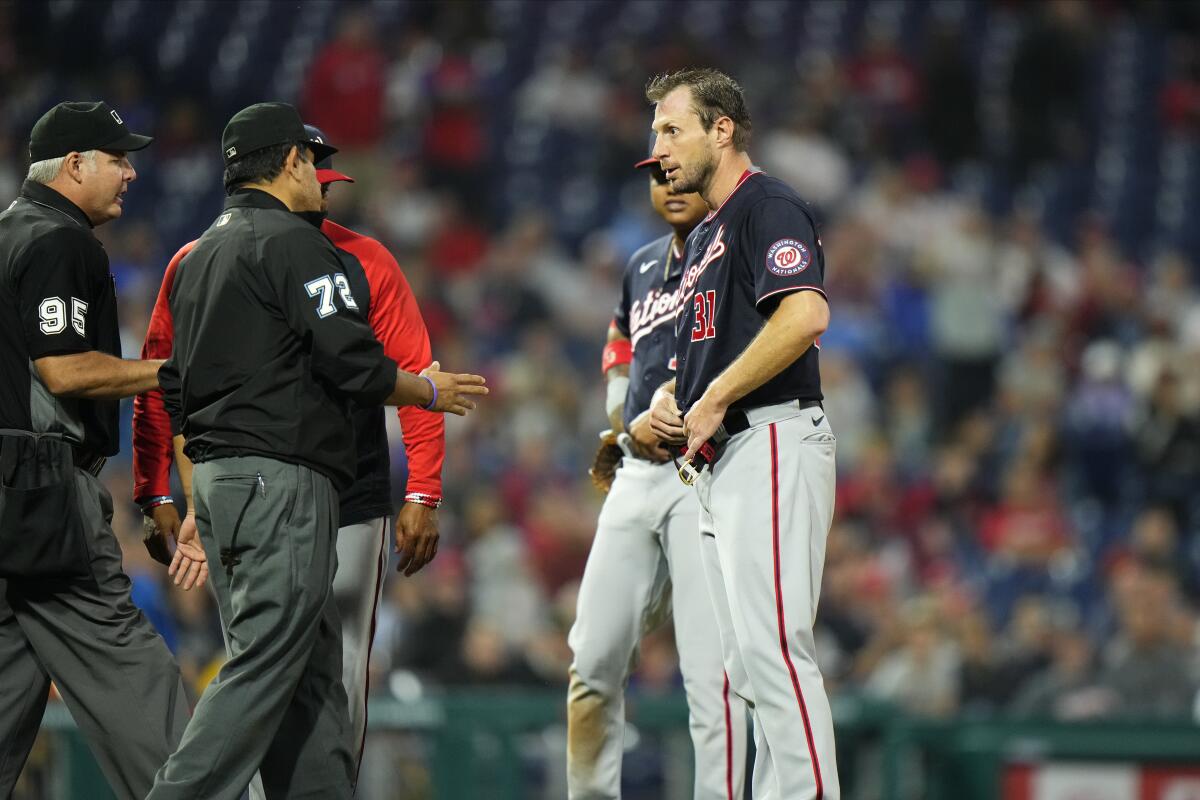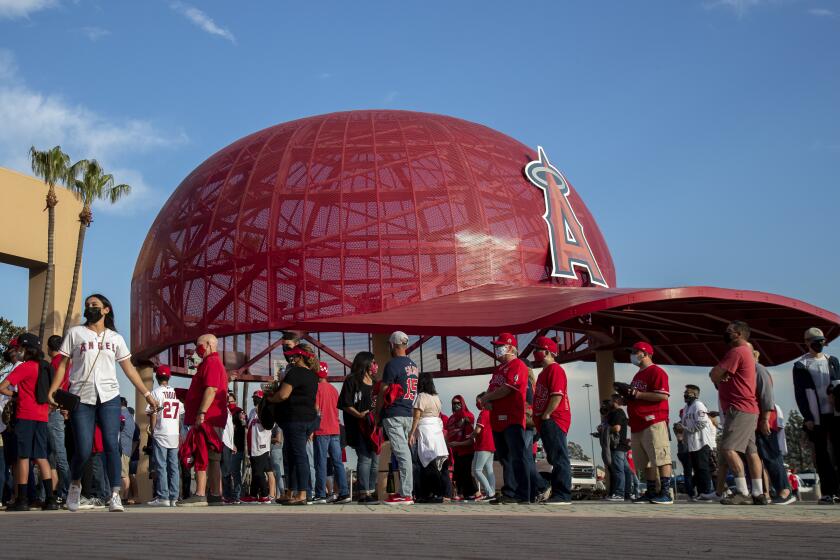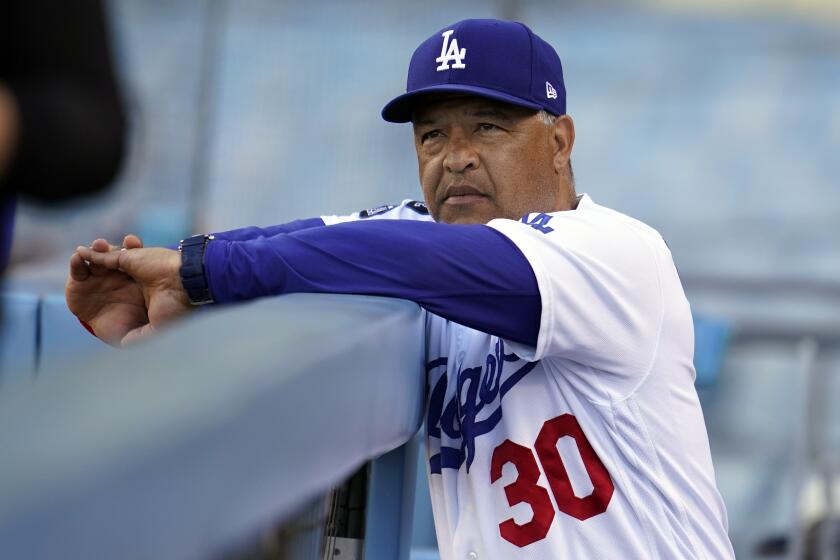Commentary: MLB has had its share of big scandals. Doctored baseballs aren’t one of them

- Share via
SAN DIEGO — This is not a scandal for the ages.
Steroids were a scandal for the ages. Hank Aaron’s 755 was the most cherished of numbers, committed to memory even by casual fans. When Barry Bonds tied that home run record in front of a visibly disgusted MLB commissioner, he was jeered from coast to coast. Roger Clemens, Mark McGwire and Sammy Sosa testified before Congress, all in an unsympathetic light.
The Houston Astros’ high-tech cheating was a scandal for the ages. Trash cans made the story easy to understand, and defiant players and an unrepentant owner made the team easy to hate.
But this? Pitchers have doctored baseballs for a century. One of them, Gaylord Perry, wrote a book titled “Me and the Spitter: An Autobiographical Confession,” then got elected to the Hall of Fame. The casual fan understands little and cares less about a spin rate that dropped from 2,618 rpm to 2,379.
From saliva to sandpaper to Spider Tack, pitchers have tried to get away with applying foreign substances. The ban has been consistent. The enforcement has not. There is no one villain: no one pitcher, no one team.
After a Cardinals pitcher had to change his cap because it was sticky, Dave Roberts discusses the widespread use of substances that enhance grip.
The current MLB commissioner, Rob Manfred, now has ordered umpires to enforce the ban. Most pitchers will comply. Some might get caught. Some, no doubt, will succeed in finding a new substance, or a new place to hide an old substance.
The crackdown could have been unveiled in the winter and implemented in spring training, in games that do not count and that few people watch. The wrinkles, anticipated and otherwise, could have been smoothed out. When the regular season started and the casual fan turned his or her attention to baseball, Shohei Ohtani and Fernando Tatis Jr. could have commanded more than a fair share of attention.
They did, and they still do. However, the unintended consequence of a crackdown that took effect this week was this: To the casual fans, the ones baseball needs to fill its ballparks and tune into or click on to its games, the ones who cannot distinguish between Spider Tack and “Charlotte’s Web,” Major League Baseball unintentionally sent a message that the sport is populated by cheaters.
“It’s pretty much condemning every pitcher in the game,” Dodgers pitcher Blake Treinen said Wednesday, “and trying to prove them innocent.”
Harkins, fired by the Angels amid MLB crackdown on pitch-doctoring, is looking to appeal after his defamation suit against team and MLB was dismissed.
On Tuesday, Washington Nationals pitcher Max Scherzer grew irate when Philadelphia Phillies manager Joe Girardi demanded the umpires perform an extra inspection — because, Girardi said later, he thought Scherzer might have been hiding a substance in his hair. On Wednesday, Nationals general manager Mike Rizzo called Girardi a “con artist” and said the episode was “embarrassing for baseball.”
The umpires have been directed to conduct routine on-field checks of all pitchers, searching for foreign substances on caps, gloves, belts and waistbands. On Tuesday, Oakland Athletics pitcher Sergio Romo did not wait to be directed, instead throwing down his cap and glove, ripping off his belt and lowering his pants to a PG-13 level.

“I don’t know if anybody has been caught yet, or has been proven to have used anything,” Treinen said.
“Is it cracking down, or is it just a façade? I don’t know. I think there’s other ways they can handle it. Why can’t there be an umpire in the dugout when a pitcher comes out? Why does it have to be in the public eye so we all look like we’re a bunch of cheaters? Nobody checks every single batter.”
That is why the casual fan saw highlights of Scherzer and Romo all day Wednesday, and not of Ohtani and Tatis.
Major League Baseball informed owners that it will enforce rules on using foreign substances on baseballs. Dodgers manager Dave Roberts is fine with that.
Scherzer blamed the spectacle on what he called “the Manfred rules.”
As we wrote last week, Manfred made the mistake of confusing self-interest with the best interest of baseball. It is unrealistic to expect players to change their behavior — and potentially cost themselves roster spots, or millions in salary — based on warnings that the guy on the other side of the field might not heed.
“We gave people the opportunity to self-correct,” Manfred told the Athletic on Wednesday, “and I don’t regret that.”
Manfred determined that too much sticky stuff had made for too little offense, and he believed he had no other option than heavy-handed enforcement, immediately. The enforcement system is all of three days old, with the vast majority of checks routine, and perhaps the wrinkles can get smoothed out sooner rather than later.
Are you a true-blue fan?
Get our Dodgers Dugout newsletter for insights, news and much more.
You may occasionally receive promotional content from the Los Angeles Times.
Even Dodgers pitcher Trevor Bauer, who assembled reporters last week to demonstrate how a ball could stick to his hand with a combination of sweat and legal rosin, had no interest in taking on Manfred after Wednesday’s 5-3 loss to the San Diego Padres in which he gave up three home runs in a no-decision.
Manfred told the Athletic that players largely supported him, even pitchers. “I think the ones the media is writing about are the pitchers who are negative with the undertaking,” he said.
Bauer declined to respond directly, saying, “I’m focusing on pitching and trying to win a baseball game. I don’t have anything to hide. I just go pitch. I don’t know what the media is writing. I don’t pay attention to you guys, really, that often. I don’t have an opinion there.”
This is not a scandal for the ages. It is a scandal for the week, maybe for the month. Baseball is a big business, but most big businesses don’t do their big cleanups while all the customers are watching.
More to Read
Are you a true-blue fan?
Get our Dodgers Dugout newsletter for insights, news and much more.
You may occasionally receive promotional content from the Los Angeles Times.














